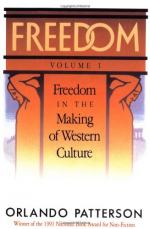|
This section contains 512 words (approx. 2 pages at 400 words per page) |

|
Freedom Summary & Study Guide Description
Freedom Summary & Study Guide includes comprehensive information and analysis to help you understand the book. This study guide contains the following sections:
This detailed literature summary also contains Topics for Discussion and a Free Quiz on Freedom by Orlando Patterson.
Orlando Patterson examines the role of the development of freedom as a social value, tracing the roots of its historical development back to the ancient days of slavery. Western civilization has always been preoccupied with freedom, and this is a peculiarly Western trait. Why is this so? Why did a concern for freedom develop in Western culture and not in non-Western culture? Patterson examines the development of this phenomenon with a three-part definition of freedom embodied in the chordal triad. Personal freedom is defined as the freedom of one individual from domination by another individual and the freedom to do as one wants within the limits of the other person's freedom. If your actions infringe on another person's personal freedom, then you have gone beyond the limits of your own personal freedom. Sovereignal freedom is defined as the right of one person to do whatever he wants without regards to the encroachment on the rights and freedom of the other. This is evident in the slave-slaveholder relationship or in the ruler-subject relationship. The last part of the tripartite is civic freedom. This is the freedom to participate in the community and its governance with the rights and obligations of civic duty clearly defined.
Patterson's examination of slavery and its impact on Western thinking begins with civilizations based on slavery, several millennia before the birth of Christ. Looking at the slave culture, Patterson examines what concepts or values are operative in the culture. In all of them, the slave is considered to be socially dead and to have no rights. There is no concept of freedom as a social value until the times of ancient Greece, around 4 B.C.
There are four important questions that Patterson attempts to answer in the book. The first is "how and why was freedom initially constructed as a social value?" The second is "how and why, after having been invented, did it emerge as the supreme value distinct from any number of other important values?" Third, he asks, "why did this rise to cultural supremacy happen only in the Western world, and for so many countries remain confined to this civilization?" His fourth and final question is "what forces maintained its status as the core value of Western civilization throughout the course of its history?" (p. xi)
The answers to these questions and the study of how freedom develops are traced through the Greek and Roman civilizations and then through the Europe of the Middle Ages and beyond, including a study of the role of freedom in Christianity. Christianity had enormous attraction for the slave and freedman classes because it offered them hope. In addition to ascertaining and defining the operative elements of freedom, Patterson examines the evolution of the changing relationships between the elements over time.
The concern with freedom, due to the experience of slavery, becomes one of the most fundamental precepts of Western civilization. In the Coda, Patterson warns of the dangers of the excess of freedom, i.e., greed, alienation and selfishness with no concern for our fellow man.
Read more from the Study Guide
|
This section contains 512 words (approx. 2 pages at 400 words per page) |

|



